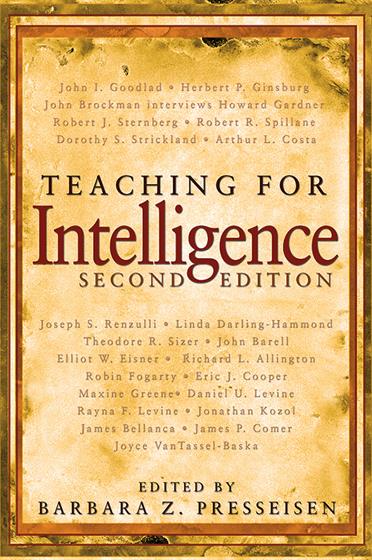- On the Habit of Informed Skepticism
- Narratives of the Educative Surround
- Truth, Beauty, and Goodness: Education for All Human Beings
- Art, Imagination, and School Renewal
- Schools Should Nurture Wisdom
- Teacher Learning That Supports Student Learning
- Did You Ask a Good Question Today?
- The Misunderstood Role of the Arts in Human Development
- What Really Matters in Teaching Children to Read
- Teaching for Intelligence: The Intellectual Life of Schools
- The Intelligence-Friendly Classroom: It Just Makes Sense
- Teaching for Intelligence: In Search of Best Practices
- Mediative Environments: Creating Conditions for Intellectual Growth
- Differentiating Instruction in the Classroom: Tapping Into the Intelligence of Every Learner
- Teaching for Intelligence: Parameters for Change
- Considerations in Introducing Instructional Interventions
- On the Habit of Informed Skepticism
- Narratives of the Educative Surround
- Truth, Beauty, and Goodness: Education for All Human Beings
- Art, Imagination, and School Renewal
- Schools Should Nurture Wisdom
- Teacher Learning That Supports Student Learning
- Did You Ask a Good Question Today?
- The Misunderstood Role of the Arts in Human Development
- What Really Matters in Teaching Children to Read
- Teaching for Intelligence: The Intellectual Life of Schools
- The Intelligence-Friendly Classroom: It Just Makes Sense
- Teaching for Intelligence: In Search of Best Practices
- Mediative Environments: Creating Conditions for Intellectual Growth
- Differentiating Instruction in the Classroom: Tapping Into the Intelligence of Every Learner
- Teaching for Intelligence: Parameters for Change
- Considerations in Introducing Instructional Interventions
- Working with Kids Like Mario
- Challenging Preschool Education: Meeting the Intellectual Needs of All Children
- Infusing Higher Order Thinking into Science and Language Arts
- On the Habit of Informed Skepticism
- Narratives of the Educative Surround
- Truth, Beauty, and Goodness: Education for All Human Beings
- Art, Imagination, and School Renewal
- Schools Should Nurture Wisdom
- Teacher Learning That Supports Student Learning
- Did You Ask a Good Question Today?
- The Misunderstood Role of the Arts in Human Development
- What Really Matters in Teaching Children to Read
- Teaching for Intelligence: The Intellectual Life of Schools
- The Intelligence-Friendly Classroom: It Just Makes Sense
- Teaching for Intelligence: In Search of Best Practices
- Mediative Environments: Creating Conditions for Intellectual Growth
- Differentiating Instruction in the Classroom: Tapping Into the Intelligence of Every Learner
- Teaching for Intelligence: Parameters for Change
- Considerations in Introducing Instructional Interventions
- Working with Kids Like Mario
- Challenging Preschool Education: Meeting the Intellectual Needs of All Children
- Infusing Higher Order Thinking into Science and Language Arts
- On the Habit of Informed Skepticism
- Narratives of the Educative Surround
- Truth, Beauty, and Goodness: Education for All Human Beings
- Art, Imagination, and School Renewal
- Schools Should Nurture Wisdom
- Teacher Learning That Supports Student Learning
- Did You Ask a Good Question Today?
- The Misunderstood Role of the Arts in Human Development
- What Really Matters in Teaching Children to Read
- Teaching for Intelligence: The Intellectual Life of Schools
- The Intelligence-Friendly Classroom: It Just Makes Sense
- Teaching for Intelligence: In Search of Best Practices
- Mediative Environments: Creating Conditions for Intellectual Growth
- Differentiating Instruction in the Classroom: Tapping Into the Intelligence of Every Learner
- Teaching for Intelligence: Parameters for Change
- Considerations in Introducing Instructional Interventions
- Working with Kids Like Mario
- Challenging Preschool Education: Meeting the Intellectual Needs of All Children
- Infusing Higher Order Thinking into Science and Language Arts
Introduction: Teaching for Intelligence
Acknowledgements
Section 1. The Value of Intelligence Theory
On the Habit of Informed Skepticism
Narratives of the Educative Surround
Truth, Beauty, and Goodness: Education for All Human Beings
Art, Imagination, and School Renewal
Schools Should Nurture Wisdom
Section 2. The Intelligent Learner
Teacher Learning That Supports Student Learning
Did You Ask a Good Question Today?
The Misunderstood Role of the Arts in Human Development
What Really Matters in Teaching Children to Read
Section 3. Instructing for Intelligence
Teaching for Intelligence: The Intellectual Life of Schools
The Intelligence-Friendly Classroom: It Just Makes Sense
Teaching for Intelligence: In Search of Best Practices
Mediative Environments: Creating Conditions for Intellectual Growth
Differentiating Instruction in the Classroom: Tapping Into the Intelligence of Every Learner
Teaching for Intelligence: Parameters for Change
Considerations in Introducing Instructional Interventions
Section 4. Special Concerns of Teaching for Intelligence
Working With Kids Like Mario
Challenging Preschool Education: Meeting the Intellectual Needs of All Children
Infusing Higher-Order Thinking Into Science and Language Arts
A Practical Approach for Developing the Gifts and Talents of All Students
Creating the Climate and Conditions for Children to Learn
About the Contributors
Index



